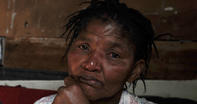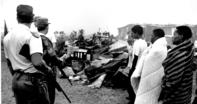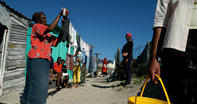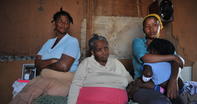A Shack in Crossroads

After some years, my family and I moved to Crossroads to build a shack. Crossroads is now a very big informal settlement, but we were one of the first families to go there, and it was just a big stretch of bush. Those times were very hard. For years - I don't know how many years, maybe six, maybe eight — we lived in a canvas shack with the sticks holding it up.
But we had to hide it every day, and we had to keep on moving from the one place to the other, because the police kept coming to find us.They did not want us in Crossroads. They said Cape Town was just for the white people and we could not put up our shacks there. They were always trying to chase us away. Every morning we had to wake up and pull the shack down before the police inspectors came. Then we hid everything we owned beneath some rocks.
This was to stop the police destroying it all. Later, when they went away, we had to rebuild the shack all over again. We had to do this every day for about four years, because if the police found our shack they just pushed it over and kicked sand over everything, trying to ruin it. But then we had to move our house somewhere else, because the police would come back.
They even came with their dogs. Sometimes they came during the day, sometimes in the afternoon and sometimes at night, many of them at once.
Police Night Raids

When the police came at night, sometimes we were naked and we ran, just like that, because the dogs were running after us, running after us. We just had to get up and go, or the dogs would bite us. One day I fell and they bit me here on my leg. I was very angry, very angry, and I was crying, I was crying.
The dogs bit me two times. I don't know what we had done, that they didn't want to give us a place to stay, just to chase us with dogs. We could hear when they were coming, with their sirens going 'Whee, whee, whee'. The first person who heard them shouted out, 'Kubomvu', meaning 'It is red, they are coming!' It was a warning, us black people's warning to each other.
Police Destruction

One day five or six policemen came, sometimes even 20 or more. We saw them on one side and ran, but they came from the other direction. We ran away again, but there they were on the other side. The policeman in charge was a tall man with black hair and a long face, called Mr Basson.
We knew this Mr Basson, because he always came and he was always swearing and shouting at us. We were very scared of him. The first time they came I was sleeping. I heard a big noise outside and people shouting angrily. When I went outside, I saw lots of people pushing Mr Basson away. But the police came back, many of them, and pushed over the shacks with their bulldozers.
They were much stronger than us, with their dogs and guns and machines. The dogs were more scary than the guns, because the dogs were chasing us and biting us. But after a while they left us alone.
They were trying to scare us. Once they put us all on many big trucks, government trucks. We were a lot of people but they were just pushing, pushing us onto the trucks. We had no time to grab anything to take with us. The truck traveled out near Stellenbosch, and the driver stopped to get petrol. We were in the back singing loudly. When the truck stopped, we banged and banged on the door.
'What do you want?' the man said. 'We want to go and wee,' we said. He let us out and we ran away and hitched back to Crossroads, all of us. When we got back, our things were still there.
The Black Sash Ladies

The Black Sash and Red Cross helped us, they helped a lot. Every time the police pushed our shacks down or the shacks got burnt, the Red Cross came with some soup and other food for us. And the Black Sash ladies came to us with a loudhailer and said we must have a meeting. At the meeting we told them everything that was happening to us.
They went to the politicians and asked why they were making the police chase us and push our shacks down, because we had no other place to go. Then the Black Sash ladies came back and told us what they said to the politicians. After that the police left us alone for a little bit. Those ladies were fighting for us, so we felt things were bad but not so bad.
These things made us realise that not all white people are the same. Some are very good and the other ones are not good because they don't want a black person anywhere near them.
By Jo-Anne Smetherham